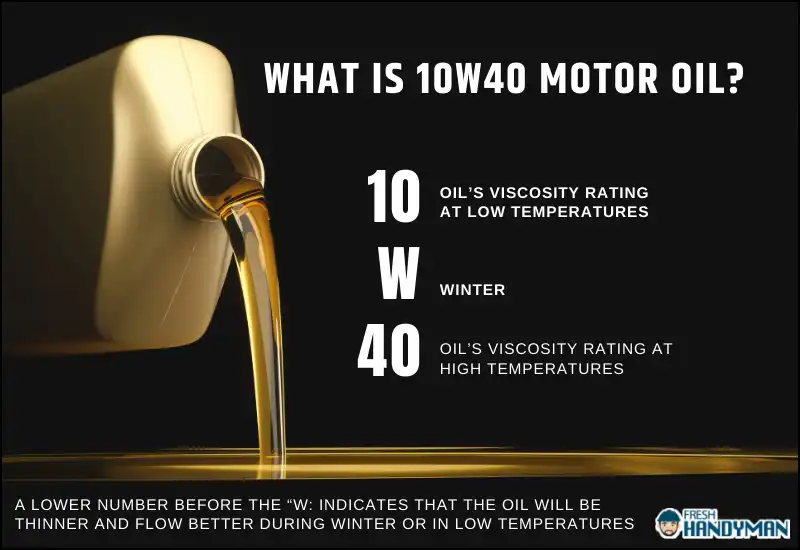Using the correct type of oil for your chainsaw is the key to ensuring optimal performance and safety. However, you cannot get access to the proper oil all the time.
You might have asked yourself, “Can I use 10w40 for chainsaw bar oil instead?”
Well, you can use 10w40 for chainsaw bar oil, although most chainsaw manufacturers do not usually recommend it. This is because chainsaw bar oil is specifically made to lubricate the chain and bar.

Even if you decide to replace it with another oil, you’ll have to do it briefly; otherwise, you might damage your chainsaw bar and chain.
In this blog, I will explore the properties of 10w40 oil and how it differs from chainsaw bar oil. I will also discuss the potential risk of using 10w40 oil as a substitute for chainsaw bar oil. Continue reading to find out more.
What is 10w40 oil?

10w40 is a motor oil that has been designed to work well in both cold and hot temperatures. This oil is mainly used in gasoline-powered vehicles such as cars, trucks, and motorcycles.
You might be wondering what the name 10w40 represents. It stands for the SAE viscosity rating of the oil. This rating system was developed by the SAE (Society of Automotive Engineers) to provide a standardized way of comparing various types of oils based on their viscosity.
The first number (10) represents the oil’s viscosity rating at low temperatures, and the “w” stands for winter. A lower number before the “w: indicates that the oil will be thinner and flow better during winter or in low temperatures.
On the other hand, the second number (40) stands for the oil’s viscosity rating at high temperatures. A higher number after the “w” usually shows that the oil will become more viscous and resist thinning when the temperatures are high.
How Does 10w40 Oil Compare to Chainsaw Bar Oil?

Chainsaw bar oil is specifically designed to lubricate the chainsaw’s chain and bar to prevent damage that could occur due to friction. It also helps prevent the chain from becoming dull due to friction-generated heat.
What is chainsaw bar oil composed of? Chainsaw bar oil comprises synthetic base oils and additives that make it adhere to the bar better. Chainsaws usually operate at high speeds, so oil is easily thrown off the chain and bar. However, these additives prevent that.
Aside from lubricating the chainsaw chain and bar, the chainsaw bar oil also cools the bar and chain, thus reducing overheating. It also forms a protective barrier that reduces rusting and corrosion, which can reduce the lifespan of your chainsaw.
10w40, as mentioned above, is a lubricant for moving parts in automotive engines. It usually flows through pistons and other parts, thus lubricating and cooling it simultaneously. Unlike chainsaw bar oil, 10w40 oil is formulated from mineral-based oils.
It typically contains more additives compared to chainsaw bar oil. These include detergents, anti-wear, antioxidants, anti-rust, viscosity rating improvers, and friction modifiers. All these additives help clean the engine and reduce friction, improving the engine’s overall performance.
Here is a table that highlights some of the differences between the 10w40 oil and chainsaw bar oil:
| Parameter | 10w40 | Chainsaw Bar Oil |
|---|---|---|
| Composition | Mineral oil, additives | Synthetic oil, additives |
| Environmentally-friendliness | Biodegradable | Non-biodegradable |
| Form | Thin | Thick |
| Tackifiers | Absent | Present |
| Cost | Costly | Cheaper than 10w40 |
Can I Use 10w40 for Chainsaw Bar Oil?

You can use it since it has been designed to provide lubrication. However, it isn’t as tacky as chainsaw bar oil, meaning it will fling off the bar more often when operating your saw at high speeds.
Consequently, the lubrication on your bar and chain also reduces. This is why it is advisable only to use it when you have no other option.
What is the Effect of Using 10w40 for Chainsaw Bar Oil?

Substituting 10w40 oil for chainsaw bar oil is a topic that has sparked much debate in the chainsaw arena. This is because some people report that they have successfully used it, while others warn of the ramifications of using it often.
- Clean-Up Will be Required
First, chainsaw bar oil is highly adhesive and tacky, making it stick to the chain and bar better. 10w40, however, is not designed to provide the same level of adhesion, meaning that it may fling off the bar more easily during use.
This will force you to adjust the oiler frequently since the chain and bar consume more. It will also increase clean-up requirements. More Friction
Second, 10w40 oil is thinner and less viscous than chainsaw bar oil since it was made to flow freely through the engine parts. It will not provide the same level of lubrication as the chainsaw bar oil.
This can result in a lack of adequate lubrication for the chain, causing it to dry and heat up. Additionally, the wear and tear on the chain and bar will increase, necessitating frequent maintenance and a reduction in the lifespan of your chainsaw.
- Becomes too Sticky in High Temperatures
10w40 oil is designed to be more viscous when it heats up. However, when the temperatures get too high, the oil can become too sticky, causing it to cling to the chain and bar rather than being dispersed effectively. This leads to poor lubrication, which can potentially damage the chainsaw.
- Reduced Cutting Performance
Without good lubrication, the cutting performance of your chainsaw is bound to reduce. You will notice that the cutting speed will decrease due to the oil becoming too sticky or increased friction. Additionally, worn-out chains and bars do not cut as efficiently as well-lubricated ones.
- Voided Warranty
Finally, using 10w40 oil as a substitute for chainsaw bar oil can void your chainsaw’s warranty. Most chainsaw manufacturers specify the type of oil that should be used in their products, and using a different kind of oil will result in the warranty being voided, so you will have to spend more on repairs.
- Increased Cost
10w40 is more expensive than chainsaw bar oil, so it will cost you more to use it as a lubricant. Furthermore, oil flinging off the chainsaw chain and bar will force you to refuel more often, which will only add to your costs.
Read Also: Stihl 045 AV Chainsaw: What Made This Chainsaw Special?
Frequently Asked Questions
Can you mix 10w40 oil with chainsaw bar oil?
No, I would not recommend you mix 10w40 oil with chainsaw bar oil. This is because they both have specific properties that make them suitable lubricants. Mixing them will only ruin these properties and reduce their effectiveness.
Can I use 10w40 for chainsaw bar oil?
Yes, you can use it temporarily. However, it is not as effective as chainsaw bar oil, and using it in the long term can result in increased wear on the components of the chainsaw.
How should I proceed if I mix chainsaw bar oil with the wrong type of oil?
If you accidentally mic chainsaw bar oil with the wrong type of oil, it is recommended that you drain the oil tank and refill it with the proper chainsaw bar oil as soon as possible.
Final Verdict
It is essential to use the right oil for your bar and chain to ensure your chainsaw’s adequate lubrication and longevity. If you find yourself without chainsaw bar oil, using a high-quality oil with good tackiness can be a temporary alternative.
You can use 10w40 oil for chainsaw bar oil temporarily; however, you should be ready to deal with the issues I mentioned in this article. These include increased wear, reduced cutting performance, voided warranty, and increased stickiness.
Read Also:
